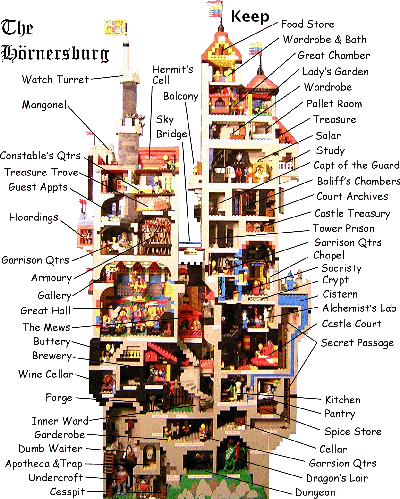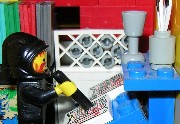|
 Map Map
Hoernersburg means "Hoerner’s
Castle". The Lego castle is located on a small man-made island near the
Rhine River in Germany. |
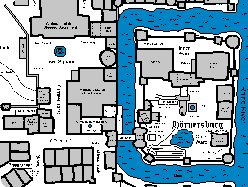 Castle
Moat Castle
MoatThe moat gives the Lego castle
extra protection. On the opposite side of the moat is the town of
Legoland. A drawbridge connects the Outer Ward of the castle to the
town. Later on, we'll tour the Outer Ward. But first, we'll tour the main
castle. |
|
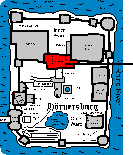 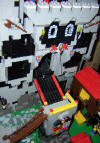
Gatehouse and Drawbridge
Before entering the Lego castle, we must pass over the drawbridge and
through the gatehouse. The gatehouse is a complex of towers, bridges,
and barriers built to protect the castle’s entrance. The Castle Porter
makes sure that no one enters or leaves the castle without permission. |
|
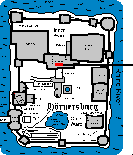 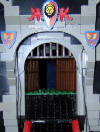
Portcullis
The Portcullis, a strong, heavy grating, slides up and down vertical
grooves in the Gatehouse. When danger threatens, the Portcullis is
dropped at once and the drawbridge is quickly raised. |
|
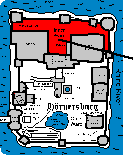 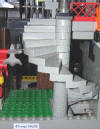
Inner
Ward
After passing through the
gatehouse, we enter the inner ward. This open area is at the center of
the castle. The Inner Ward is surrounded by a wall called the Inner
Curtain.
The Inner Ward of the
Hoernersburg Lego castle is cramped, making it difficult for enemies to group.
A winding staircase gives defenders the advantage. Since most people are
right-handed, enemy soldiers storming up the staircase find it nearly
impossible to wield their swords. |
|
 
Forge
Nearby the Inner Ward, we
find the Forge, Brewery, The Mews, and of course, the Great Hall. The
Forge is a workshop where the Armourer manufactures and mends armor and
weapons. |
|
 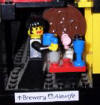
Brewery
Above the Forge, we find the
Brewery. This is where beer and ale are made, often by an Ale-Wife.
Brewing of beer and ale was traditionally the job of women. Another
worker called an Ale Conner tests the purity of ale. |
|
 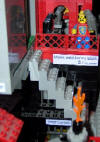
The
Mews
As we climb the stairs and
approach the entrance of the Great Hall, we pass by The Mews. A mew is a
cage or shed in which falcons are kept while molting, that is, while
shedding feathers. The Falconer is in charge of training the falcons. He
is a highly skilled expert responsible for the care and training of
hawks for the sport of falconry. The Falconer trains the Baron’s
falcons. Sometimes, the falcon is tied to a block of wood called a
weathering block. This block is located outside so that the falcon can
get used to bad weather. |
|
 
Great
Hall
Now, we enter the Great Hall -- the largest room in the castle.
This is where the Baron holds banquets and festivities. As we pass
through the large doors, we great the Usher, who is the doorkeeper for
the Great Hall.
|
|

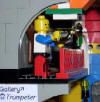
Great
Hall Gallery
Above the Great Hall is a
balcony called the Gallery. From here, the Trumpeter blows his trumpet
to announce the beginning of the feast. And what a feast it is. |
|

Menu
for Tonight
Tonight, we will dine on:
pastries, asparagus, roast gray partridge, whole calves’ heads, roosters
and pigeons, wild boar, whole roast sheep with sour cherry sauce, a
great variety of roast birds – turtledoves, pheasants, quail, figpeckers
– accompanied by olives. We’ll eat roast suckling pig, roast peacock,
quinces cooked with sugar, cinnamon, pine nuts, and artichokes. Various
preserves, made with sugar and honey. And finally, ten different tortes,
an abundance of candied spice, and a sugar sculpture – called a subtlety
– in the shape of a giant chicken! |
|
 
High
Table
The most important guests
sit at the High Table with the Baron and Baroness.
Below the High Table, we find the Low Tables. This is
where less-important guests eat. Since the Castle Cook uses no salt to
season the food, diners help themselves to a boat-shaped salt-cellar.
The salt-cellar is placed in front of the Baron, and is an indication of
status. The Baron, his family and important guests sit "above the salt"
at the high table, while less-valued diners sit "below the salt". |
|

Manners
The procession of food
begins. Food is not served on plates. Instead, everyone has a trencher,
which is a thick slice of stale bread, or they share one with their
neighbor. Servants serve food onto the trencher, and diners pick up the
food with their fingers, or with another piece of bread called a sop.
Soups and stews are served in shallow silver-rimmed bowls called mazers.
Since forks had not yet been invented, people manage with a knife and
perhaps a spoon. Because there is a shortage of cutlery, and people have
bad teeth, most castle food is mashed to a pulp in the castle kitchen.
When eating in the presence of the Baron and his wife,
there are certain ways to behave: "Do not spit upon or over the table,"
"If you wash your mouth out while at the table, do not spit the water
back into the bowl, but instead spit politely on the floor," "If you
blow your nose, remember to clean your hand by wiping it on your
clothes," "Don't wipe your teeth or eyes with the tablecloth," "If there
is a man of God (such as a priest) at the table, take special care where
you spit," "Do not pick your teeth at the table with a knife, straw, or
stick," "Do not belch near anybody’s face if you have bad breath." |
|
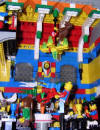
Entertainment
During dinner, there is much
entertainment. The Jester tells comical stories. Jugglers toss balls in
the air until they almost touch the roof. Tumblers and Acrobats wrestle
and roll. Minstrels sing and play instruments. And of course,
Stilt-Walkers provide their own form of amusement. |
|
 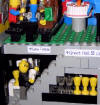
Buttery
Below the Great Hall, we
find the Buttery. It is from here that wine and other beverages are
served. Beverages are kept in bottles and butts, which are large barrels
or casks. The Butler is in charge of the Buttery. Serving beverages is a
complex affair and involves many people. Dispensers pour the wine and
beverages into cups and goblets. Cupbearers carry the drinks from the
Buttery to the Great Hall. |
|


Wine
Cellar
In the Wine Cellar, we meet
the Cellarer. He is in charge of storing and looking after wine and
other beverages. He also acts as a wine taster. The Tapster has the job
of drawing wine and ale from the barrels. |
|


Garrison
Quarters
Above the Great Hall are
many more rooms. Let’s visit the Garrison Quarters, Armory, Guest
Apartments, Steward’s Quarters, Hermit’s Cell and even climb up to the
Watch Turret.
The Garrison is the body of
soldiers who live in the castle and defend it. Here in the Garrison
Quarters, we’ll find Archers, Pikemen, and other men-at-arms passing
away their time. |
|

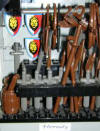
Armory
Next to the Garrison
Quarters is the Armory. This is where weapons are stored in case of
battle: longbows, crossbows, swords, and pole arms, such lances,
halberds, and pikes, |
|


Hoardings
On the outer walls of the
Lego castle are Hoardings. These are wooden extensions that provide good
defensive positions for the castle troops. |
|

Gargoyles
On the exterior of the
Great Hall are gargoyles. These grotesque stone figures have the
practical purpose of acting as rain gutters. But perhaps they’ll also
serve to scare aware those who might have evil intentions toward the
Baron. |
|


Guest
Apartments
Above the Garrison Quarters
are the Guest’s Apartments. This is where guests visiting the castle
stay. Look out! A robber seems to have found this room as well. |
|
 

Steward's
Chambers
One floor up are the
Steward’s Chambers. Next to the Baron, his quarters are the nicest. The
Steward is responsible for taking care of the day-to-day affairs of the
castle, such as finances and supplies. The Steward also supervises the
household and events in the Great Hall. When the Lord and Lady are away,
the Steward is in charge of the castle. |
|


Treasure
Trove
Don’t tell anyone, but I’ll
let you in on a secret. There is a trap door on the floor of the
Steward’s Chambers that leads to a hidden treasure trove. |
|


Hermit's
Cell
Near the top of the
Lego castle
is the Hermit’s Cell. This is where a religious person, called a Hermit,
withdraws to spend most of his time in prayer and solitude. Shhh…don’t
disturb someone in prayer! |
|


Mangonel
On the roof of the castle is
a Mangonel (or small catapult) used to hurl missiles through the air at
river boots trying to evade paying tolls to the Baron. |
|


Watch
Turret
At the top of the
Lego castle is
the Watch Turret. Here, the Lookout is responsible to watch for
approaching enemy soldiers. Don’t look down! |
|


Lower
Garrison Quarters
Now, let’s return to the
Inner Ward. Beneath the Inner Ward and Great Hall, we’ll find even more
rooms. These include additional Garrison Quarters, a Cesspit, the
Undercroft, and an Apotheca.
Immediately below the Inner
Ward are further Garrison Quarters. These men can quickly storm into the
Inner Ward in case of attack. Looks like most of them are somewhere
else. |
|


Garderobe
Here’s one using the
Garderobe, also called a privy or lavatory. You’ll notice that his
"droppings" fall down a Latrine Shaft. Many an enemy has tried to gain
entry into the castle through this shaft only to encounter an unexpected
– and undesired – surprise. |
|

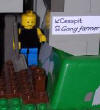
Latrine
Shaft and Cesspit
The Latrine Shaft leads to a Cesspit. This is a small room in which the
waste from one or more Garderobes is collected. The Cesspit is cleaned
out on occasion by the Gong Farmer. |
|

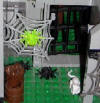
Undercroft
Below the castle is the Undercroft. This is a vaulted basement or cellar used for
storage. The Storeman is in charge of making sure that things are
properly stored. |
|

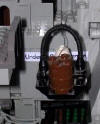
Dumb
Waiter
Supplies from the Undercroft
are hoisted up into the castle by a Dumb Waiter. |
|


Apotheca
Down in the bowels of the
castle is also found an Apotheca. This is a storeroom for valuable
goods. It seems that another thief has entered the castle! |
|

Trap
Door
Too bad for the thief -- this room
is equipped with a ghostly scare and a trap door too! |
|


Trap
Door Landing
You don’t really want to
know where he landed face first. This Lego castle is full of surprises. |
